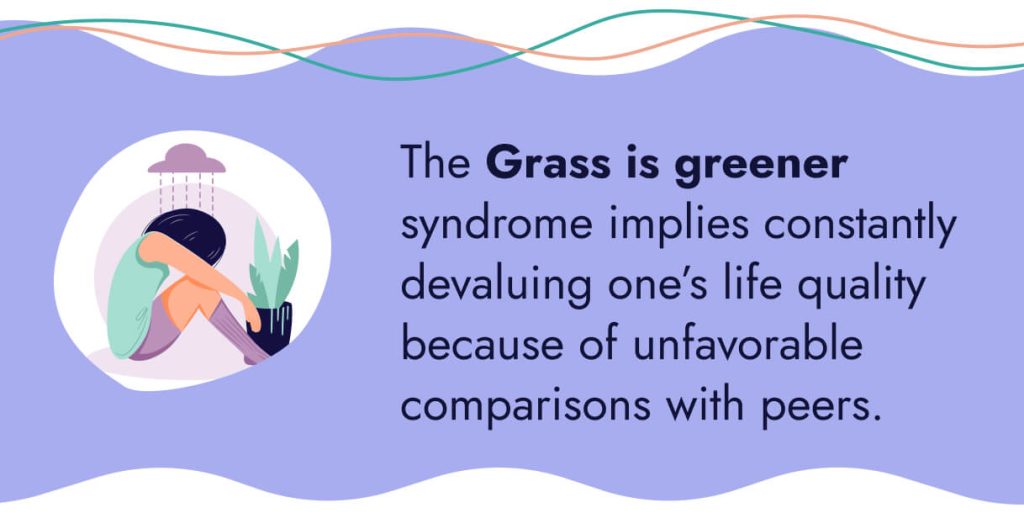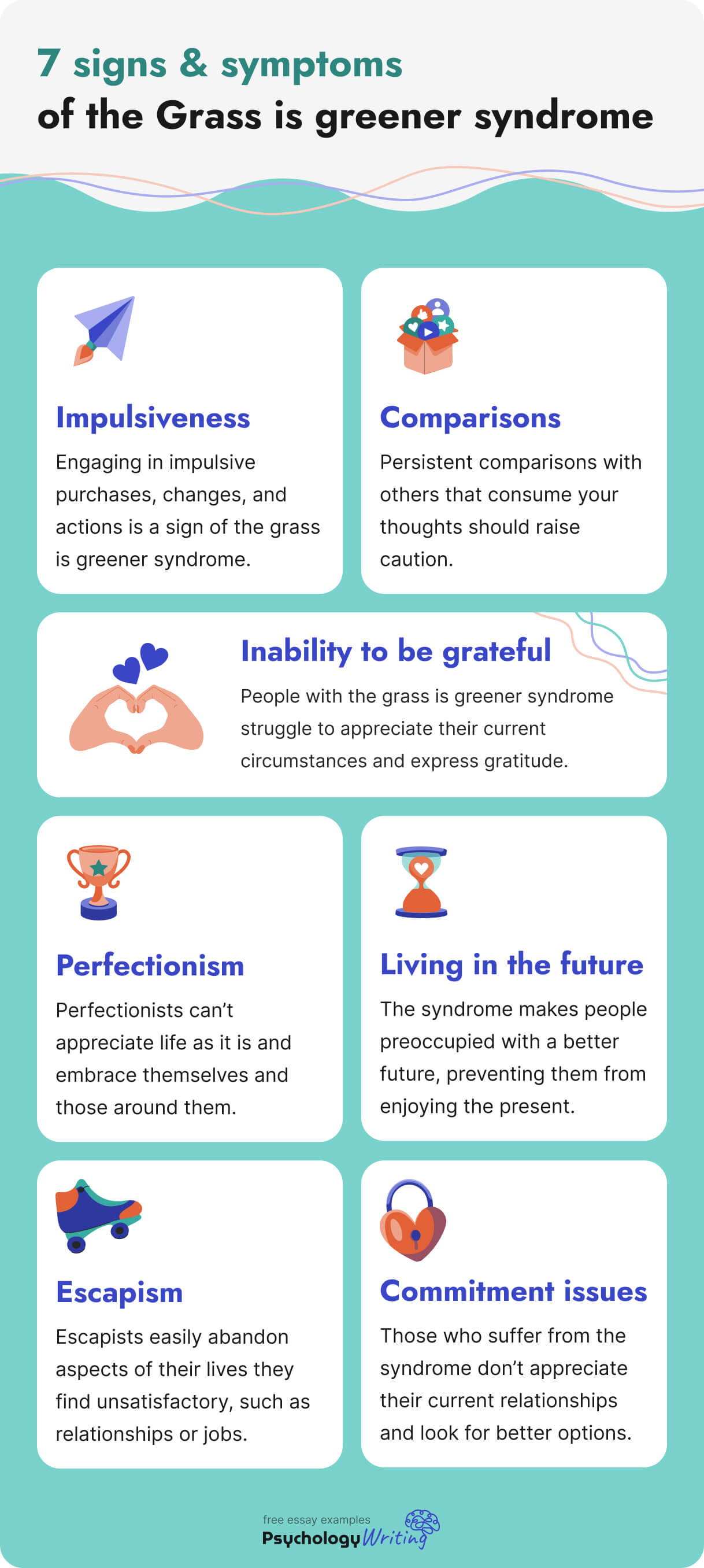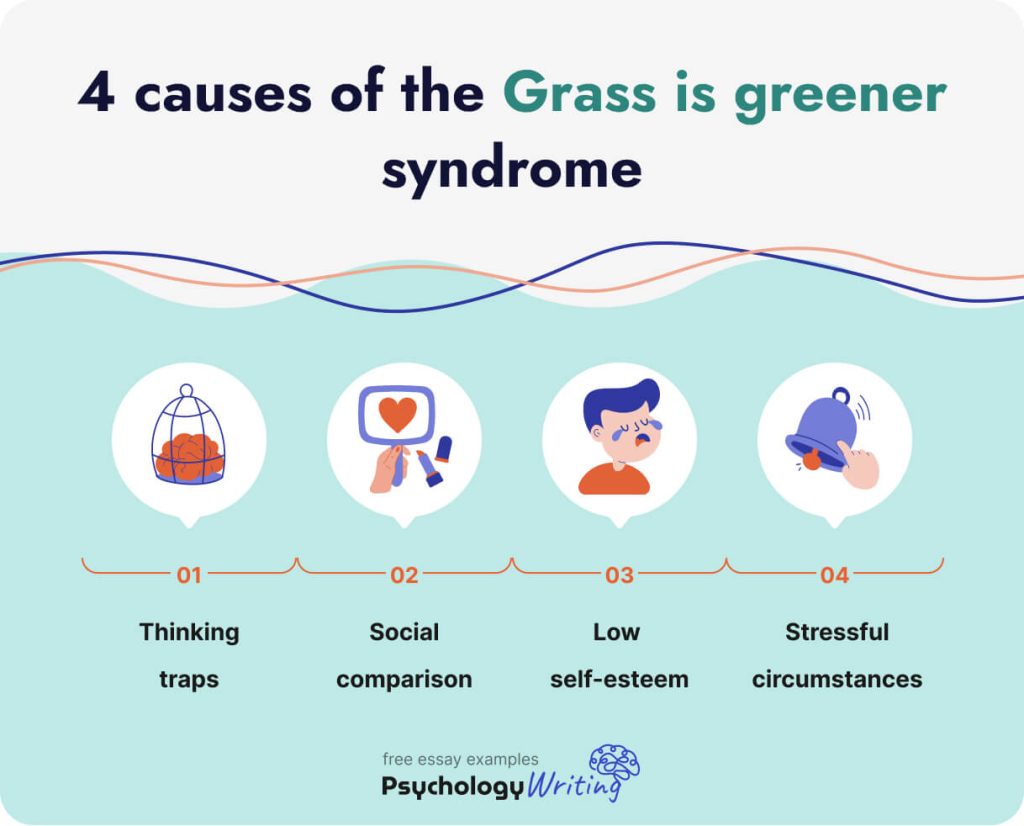As social creatures, people naturally assess their progress and achievements by comparing themselves to others.
However:
This tendency can spiral into a self-defeating obsession, leading individuals to diminish their successes and dwell on their failures. The issue is aggravated even more by the public portrayal of seemingly perfect lifestyles in social media. Those artificially happy façades and daily routines leave others feeling inadequate about their own lives.
The described phenomenon is known as the “Grass is greener” syndrome – a persistent devaluation of one’s quality of life due to unfavorable peer comparisons.
This article will examine the syndrome in detail, exploring its causes, symptoms, and strategies for management.
🌿 Grass Is Greener Syndrome: Understanding Its Nature
In essence, the Grass is greener syndrome refers to a condition in which a person consistently believes that better options exist elsewhere rather than in their current circumstances. Essentially, they struggle to appreciate what they have and always perceive others as having more. This syndrome can manifest across various aspects of life, including:
- Studies,
- Career,
- Relationships,
- Appearance,
Or simultaneously in multiple domains.
However:
It’s essential to clarify what the Grass is greener syndrome is NOT. Some people confuse it with abusive relationships or the envy a single person might feel when looking at happy couples.
Instead:
The syndrome manifests when individuals have healthy relationships yet continually compare them to others, ruminating on whether they deserve a better partner.

People succumb to the Grass is greener syndrome, not when their circumstances are objectively unfavorable, but when they live everyday lives within their comfort zones yet fail to appreciate them fully.
As a result:
They may develop anxiety, depression, stress, and sleep problems without concrete reasons for these negative states. While the Grass is greener syndrome may not qualify as a clinical disorder in technical terms, it can still negatively impact a person’s quality of life.
🪞 Grass Is Greener Syndrome: 7 Signs & Symptoms
While the syndrome we’re discussing here eludes an official diagnosis or a concrete definition, it can still be detected by several common signs and symptoms. If you find that your self-evaluation consistently falls below the objective quality of life you have, watch out for the following red flags.

- Impulsiveness
Engaging in impulsive purchases and other actions is an early warning sign of the Grass is greener syndrome. Such behavioral patterns imply a constant search for ways to improve your life and an aversion to maintaining the status quo. - Comparisons
Persistent comparisons with others that consume your thoughts should raise caution. Fixating unfavorable comparisons instead of objectively evaluating your current situation can increase distress and dissatisfaction. - Inability to Be Grateful
Gratitude for what one has is often considered the key to inner harmony and happiness. Yet, people with the Grass is greener syndrome struggle to appreciate their circumstances and express gratitude for the people and fortunate events in their lives. - Perfectionism
People with a perfectionist mindset can’t find contentment in the present moment, continually seeking ways to improve every aspect of their lives. This perpetual quest for perfection deprives them of the simple joys of appreciating life as it is and embracing themselves and those around them. - Living in the Future
The syndrome drives affected people to be overly preoccupied with a better future, preventing them from thoroughly enjoying the present and appreciating the beauty of the world around them. However, the envisioned future never materializes, perpetuating a negative mindset in the present. - Escapism
It’s common for people grappling with the Grass is greener problem to abandon aspects of their lives they find unsatisfactory, such as relationships or jobs. Escapist behavior stems from a lack of appreciation for their current circumstances and a tendency to view their life negatively, opting for escape rather than seeking solutions. - Commitment Problems
Due to the constant comparison of their lives with others, people with the Grass is greener syndrome always search for a better partner. As a result, they don’t appreciate their current relationships and easily end them in pursuit of what they perceive as better options.
😶 4 Causes of the Grass Is Greener Syndrome
Comparing yourself to others is a natural biological mechanism, a product of millennia of human evolution aimed at survival.
However:
This process becomes problematic when it takes on pathological forms and worsens one’s quality of life. If you notice that comparisons, especially with unfavorable outcomes, become a chronic issue for you, consider exploring the underlying causes.

Cognitive Traps
People often fall into cognitive traps that shape their perception of events and contribute to the development of the Grass is greener attitudes. These traps are:
- The “all-or-nothing” thinking, where minor successes are discounted if they damage absolute perfection.
- The “comparative” thinking mindset that drives people to seek out successful peers and undervalue their own achievements. This mindset results in a chronic disregard for the positives in one’s life, with an excessive focus on the negatives.
- The “fortune-telling” trap which makes individuals believe they would be more successful if they had made different decisions in the past, such as marrying another person, choosing another profession, or relocating to another city.
The Culture of Social Comparison
Social comparison has become a prevalent issue today, primarily attributed to the rise of social media. Influencers and community figures showcase their lives online, using platforms like Instagram and Facebook as 24/7 channels to broadcast their successes. Consequently, their devoted followers often experience a pervasive sense of inadequacy and envy.
However, this phenomenon has a significant downside: individuals rarely present their lives in an unfiltered format, and many seemingly enviable achievements are staged performances. Unfortunately, few recognize this reality, while millions live under the chronic pressure of envy.
Low Self-Esteem
Extensive research has explored the negative impact of social comparison on self-esteem. Two kinds of comparison can be highlighted.
- People make upward comparisons, evaluating their lives against those they perceive as objectively better off.
- At the same time, they make downward comparisons, evaluating themselves against those they consider objectively worse off.
For example, a 1991 study by Richins demonstrated that individuals with lower self-esteem are more likely to engage in upward social comparisons. This destructive strategy further diminishes their self-esteem even more. It’s crucial to recognize and address such comparisons to improve self-esteem.
Stress
Chronic stress is ubiquitous in modern life, affecting us in various domains such as work, studies, and relationships. Stress amplifies the urge to compare oneself to others, often leading to the belief that others necessarily lead better lives.
However:
This mindset perpetuates a closed, vicious cycle: stress fuels the Grass is greener syndrome, which, in turn, exacerbates stress levels further. How can you break free from this cycle? Let’s explore solutions in the following section.
🏆 8 Tips to Overcome the Grass Is Greener Syndrome
Don’t despair upon noticing the early signs of the Grass is greener syndrome in your attitudes and mindset. There’s always a chance to overcome this distressing condition and seek tangible improvements in self-evaluations.

Tip #1 – Mind Your Thoughts
Most of us accept our thoughts unconsciously, but not all are beneficial. When you notice that your thoughts are becoming increasingly stressful and problematic, it’s time to engage in conscious thinking and challenge your mindset. Take note of any negative thoughts and analyze their causes. Look for inconsistencies and counter them with more positive thoughts.
Tip #2 – Eliminate Cognitive Distortions
As discussed earlier, thinking traps can be pervasive and debilitating. However, you can address them by reframing negative thoughts into positive actions. This method is helpful when you become fixated on a failure and obsess over it instead of looking for a solution. Reframing will help you shift the focus from the failure to possible solutions. Take note of the following example:
NEGATIVE: I am not worthy of a good job.
REFRAMED: I failed this job application but will update my CV and explore other opportunities.
Another way to combat cognitive distortions is to confront your identified weaknesses consciously. If you feel that your CV is too weak for your dream job, educate yourself on the principles of CV composition to create more impactful resumes.
Remember:
Thoughts are subjective evaluations and rarely reflect objective reality. Once you realize this, adopting a flexible mindset and reframing your thoughts becomes easier.
Tip #3 – Do a Digital Detox
Experience demonstrates that the severity of the Grass is greener syndrome correlates directly with how much time a person spends online. Dependence on social media, extensive use of smart devices, and constant scrolling through news feeds are well-known stressors.
Therefore:
A digital detox offers an excellent opportunity to unwind and reset your thought patterns without external influences.
Once you step away from the glossy images portraying the seemingly perfect lives of idols, you get a more impartial, realistic, and positive perception of your own life’s qualities and inherent virtues.
Another benefit of a digital detox is gaining insight into the sources of negative thoughts. For some people, it may be Instagram, while others may find themselves excessively drawn to Facebook. Once you identify the primary source of distress, consider removing the app or limiting its use to a minimum.
Tip #4 – Practice Gratitude
People experiencing the Grass is greener syndrome often struggle with feeling and expressing gratitude. Fortunately, these skills can be cultivated, and we recommend focusing on simple things first. You can start by reflecting on how you express your gratitude; this will help you discern what you’re really thankful for.
With a mindful approach, you transform gratitude into a meaningful practice rather than an automated response.
Here are a couple of practical techniques recommended by Mindful.org experts.
Gratitude Journaling
Incorporate gratitude journaling into your daily routine. While it may initially be challenging to identify things you’re thankful for, it becomes easier with practice. This habit allows you to recall even the smallest moments of joy throughout the day and learn to appreciate them.
Extracting Lessons from Negatives
Appreciating the positives is easy, but life is not only about happy moments. You can take a significant step in self-development by learning from negative experiences and extracting valuable lessons from adversity.
Visual Cues
People quickly forget their commitments to practice mindfulness, but having a visual reminder is the best way to stay on track. Associate your gratitude routines with specific people or places; soon, these practices will become second nature.
Tip #5 – Practice Mindfulness
One of the syndrome’s most detrimental outcomes is the person’s inability to concentrate on the present moment and its inherent positives. An effective remedy for this issue is a series of mindfulness practices. There is solid empirical evidence supporting the efficacy of these practices in treating social anxiety disorder.
The experiment involved participants in a 10-day mindfulness program employing simple techniques. We’ll explore several of these techniques below.
The Raisin Exercise
This exercise is particularly suitable for beginners due to its simplicity and adaptability. Participants are instructed to take a raisin and imagine eating it for the first time. The exercise includes the following steps:
- Visual examination of the raisin to observe its color, texture, and overall appearance.
- Exploring the tactile sensation of the raisin between your fingers.
- Noting the sensation experienced when gently pressing the raisin.
- Observing the aroma emitted by the raisin.
- Tasting the raisin and experiencing its transformation in your mouth.
By mindfully consuming the raisin (or any other product), you notice subtle sensations and enhance mindfulness in your daily routine.
The Body Scan
A full body scan is an effective mindfulness practice that aids in re-establishing a connection with your body and anchors you in the present moment. It allows you to focus on various body parts, bringing you back to the here and now. The procedure scans your body, from the toes to the top of your head. You can also practice the body scan by following this YouTube video:
The 3-Minute Breathing Space
This variation is ideal for people who struggle to concentrate during meditation. It is straightforward to perform and includes three one-minute exercises:
- During the first minute, answer the question, “How am I feeling at this moment?” As you ask it yourself, observe your mind and bodily reactions to gain insight into your current emotional and physical state.
- The second minute is dedicated to mindful breathing. Focus on each breath, attentively observing how air flows in and out of your nose.
- In the final third minute, shift your attention from breathing to its impact on your entire body. Notice how each breath affects you as a whole.
Tip #6 – Control Your Actions
As noted earlier, impulsiveness is a significant negative trait observed in individuals with a Grass is greener syndrome. This behavior leads to a detrimental cycle of seeking happiness elsewhere, often resulting in impulsive and costly purchases or frequent relocations in search of an ideal location.
A constructive approach to counteracting these behaviors is carefully considering each action and cultivating a strategic thinking habit. Evaluate the potential consequences of your choices and proceed only when you’re sure about them. A helpful tip is to list the pros and cons of specific actions when faced with dilemmas or pause for 1-2 days before making significant decisions.
Tip #7 – Reduce Stress Levels
While stress is inevitable to some extent, it can be effectively managed. Explore various techniques to discover the methods that work best for you. This could involve mindfulness practices, engaging in balanced physical activities such as yoga, or pursuing a low-stress job that will minimize exposure to stressful situations and people.
Tip #8 – Ask for Help
If you have exhausted all options and continue to experience distress because of chronic negative comparisons, it makes sense to seek therapy. An effective approach to reframing negative thoughts and addressing stress is cognitive behavioral therapy (CBT). If you’re unsure whether therapy is the right choice for you, consider reading the article “Psychotherapy: Do I Need It? A Guide for College Students” for detailed guidance on the matter.
Thank you for reading!
Armed with knowledge about the Grass is greener syndrome, you are now equipped to confront and overcome it. Do you know someone who’s struggling with this problem? Don’t hesitate to share this comprehensive guide with them. Here’s to improving your quality of life and boosting your self-esteem!

